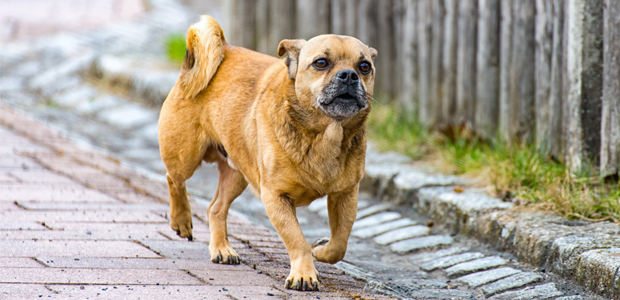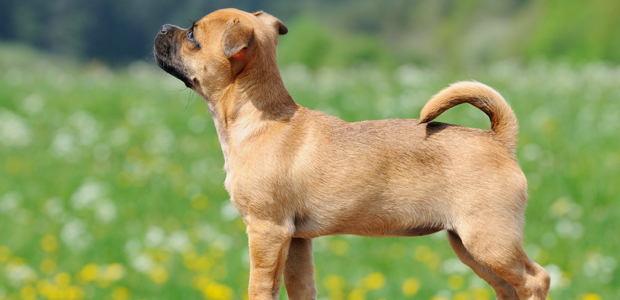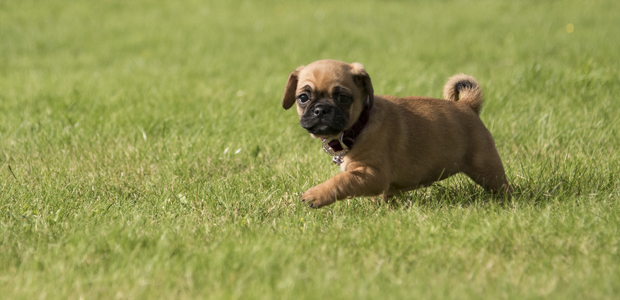The Jug: is it the right breed for you?
A relative newcomer in terms of breeds, the Jug is fast becoming a popular breed among owners in the UK. The Jug combines the energetic and playful nature of the Jack Russell with the affectionate and easy-going Pug.
The Jug will often inherit the recognisable face and curly tail of the Pug, although they are not as stocky. Their coat can either be smooth or rough. These outgoing dogs make for great companions and their small stature means they are well suited to apartment living.
Jug summary:
- Energetic & easy-going dogs
- Short coat
- Variety of colours including black, brown & fawn
- Average size = 25 - 36 cm
- Average weight = 5 - 10 kg
- Life expectancy = 12 - 15 years
- Estimated monthly cost = Medium
- Exercise needs = Medium
- Attention needs = Medium
- Sociability = Medium
Please note: A dog’s exercise, training/stimulation and grooming requirements can depend on several factors such as age and health. The same goes for ongoing costs of ownership. For advice on one specific dog, we always advise chatting with a vet.
How much exercise does a Jug need?
Jugs are small in stature but big in energy. The Terrier part of their make-up means they love to get outside and explore, but their Pug genes mean that they don’t need as much exercise as a Jack Russell. They need to be walked for around 45 minutes every day, which can be split into a shorter walk in the morning and a longer, more interesting walk in the evening.
They can have a high prey drive and might instinctively chase after squirrels and rabbits. To keep them happy and healthy, take them to a secure environment where they can run off-lead, with lots of interesting things to see and sniff.
As with all breeds, be careful not to over-exercise them whilst they are still growing, as this can have long term effects on their joints. In the summer months exercise them outside during the cooler parts of the day so they don’t overheat. As well as outdoor activities, Jugs need to stay mentally stimulated with training and puzzle games.

Jug temperament, socialising and ideal home environment
Jugs are loving dogs that make for a fantastic addition to the family. They are confident and tend to be very brave, but be careful that this feistiness is kept in check and doesn’t lead to aggressive behaviour.
They will generally get on well with children and other pets if they are well socialised from an early age. When it comes to living environments, Jugs are quite adaptable and will happily live in an apartment or a house in the country.
Whilst they are still so young and receptive, it's a good idea to introduce your Jug to other dogs, people and livestock as well as car travel and unfamiliar noises, such as traffic. It’s good practice to leave them on their own for small periods during training so that they can get used to being by themselves.
If you’re looking for a loveable, strong-minded companion, the Jug may be just the breed for you!
Training: how to train a Jug
Jugs can be stubborn and will look to push the boundaries as they like to be dominant, but they are intelligent and will look to please their owner. They don’t respond well to heavy-handed treatment or scolding, instead preferring positive reinforcement, praise and plenty of treats. Keep training sessions short, reward-based and different each time.
Be careful not to give your Jug treats that are too calorific, as they can put on weight fairly easily. Instead, use natural treats that are rich in vitamins and nutrients, like protein-rich meats such as chicken and turkey, or fruits and vegetables like melons and carrots.
As is the case with all breeds, Jugs will start to approach new experiences with caution when they are around 12 weeks old. Therefore, it’s really important for their development that they experience as many different situations as possible.

Grooming: do Jugs shed?
A Jug’s coat is short, with some being rougher than others, depending on their genetics. Despite their short coat, they are quite heavy shedders, so if you’re house proud, they might not be the best breed.
Jugs need to be groomed regularly to prevent knots and tangles. A daily brush is a great way to make sure their skin and coat stays in tip-top condition, as well as providing an opportunity to bond with your dog.
Complete your Jug’s grooming routine with regular tooth brushing, nail clips and ear checks.
Cost of owning a Jug
When considering the lifetime cost of owning a Jug, remember to take into account the following costs:
- Jug food and diet needs
- Veterinary care
- Pet insurance
- Kennels or dog sitters
- Regular Jug grooming costs
- Toys and equipment
Are Jugs prone to any health problems?
Jugs are prone to certain health problems, just like all breeds. This doesn’t mean your dog is guaranteed to contract any particular disease – it’s just something to bear in mind.
The Jug will likely inherit the recognisable Pug face, and snout sizes differ although breeders are attempting to combat the breathing problems inherited from the flat-nosed (brachycephalic) Pug.
As brachycephalic dogs, Jugs are on average more susceptible than other breeds to a range of health problems. They may require surgery to open their airways and improve their breathing. For more information on brachycephalic breeds, contact your vet.
To keep your Jug as healthy as possible, monitor them closely and attend routine 6-month health checks with your vet. This will allow the vet to give your dog a thorough check-up and to pick up on minor (often symptomless) conditions before they have a chance to escalate into something worse.
Possible health complications for Jugs Include:
- Breathing problems associated with brachycephaly
- Dental issues and gum disease in dogs
- Infections
- Canine obesity and weight problems
- Allergies in dogs (including flea, food and pollen)
- Hip dysplasia
- Deafness
Before welcoming a new dog into your household, make sure you’re able to cover the costs of any routine or emergency medical treatment they may need. Pet insurance will help massively with this. Why not ask your vet about their recommended pet insurance policy?

Jug dietary requirements
Your Jug will need a balanced diet rich in nutrients, vitamins, and minerals. It’s best to feed them complete dog food specially formulated for small breeds to ensure that they are getting the right amounts of vitamins and nutrients.
Growing pups may prefer 3-4 smaller servings during the day, rather than two larger meals. This can be reduced to two meals a day as your dog gets older.
The recommended portion size will depend on your individual dog. You’ll need to take into account their activity level, age and metabolism. To avoid weight gain, make sure your Jug has a healthy and balanced diet and gets plenty of exercise.
For dietary advice that’s specific to your dog, have a chat with your local vet or the breeder you’re purchasing your puppy from.
Are Jugs suitable for first time owners?
Jugs make great pets for first-time dog owners, because of their willingness to please and kind nature. They are happy living in apartments and have fairly modest exercise requirements, so they are a great choice for people who live in the city.
If you are able to give them the time and attention they need, owning a Jug can be an enjoyable and rewarding experience.
Need more info?
For more info on finding the best dog breed for you and your lifestyle, have a chat with your vet. Find your nearest vet using our Find a Vet page.

